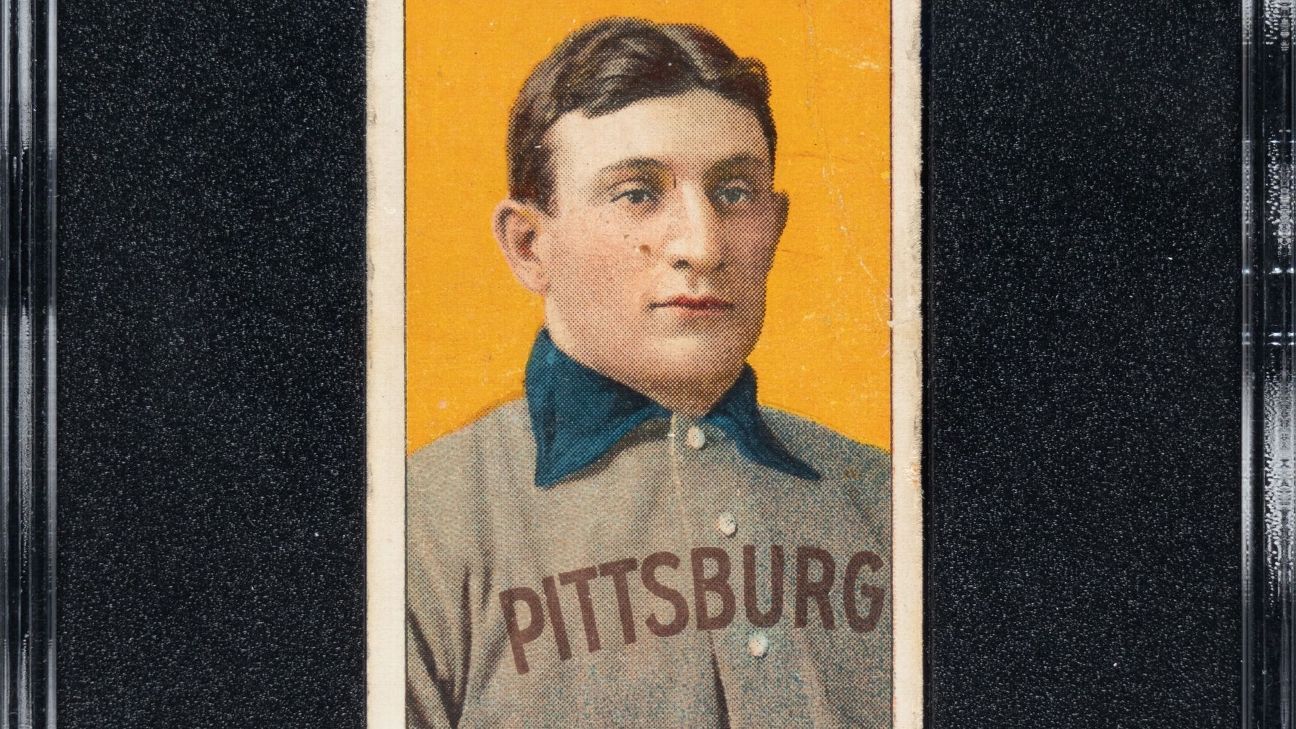A T206 Honus Wagner baseball card sold for $6.606 million — which includes a 20% buyer’s premium — early Monday morning, shattering the record for highest-selling sports card of all time.
The previous record belonged to a 1952 Topps Mickey Mantle card that sold for $5.2 million in January, a record later matched by a 2003-04 Upper Deck Exquisite Collection LeBron James-autographed rookie jersey card in April.
The seller of the Wagner card is an “East Coast collector.” Both seller and buyer prefer to remain anonymous.
“This Wagner stands out because of its condition,” said Brian Dwyer, president of Robert Edward Auctions, which brokered the deal. “There’s only about 60 of these that we can confirm through various population reports and available grading data. Of those 60, most are rated poor, authentic or good, at best. This card is one of the best examples out there, and it’s certainly one of the best examples available.”
This Wagner card received a grade of 3 from Sportscard Guaranty Corp. (SGC). According to population reports from the three biggest card-grading companies — Professional Sports Authenticator (PSA), Beckett Grading Services (BGS) and SGC — only four T206 Wagners have been graded higher than a 3, combined, all in private collections.
The card was on display at the National Sports Collectors Convention in Rosemont, Illinois, in July. Nearly 100,000 people attended the conference — the second-largest attendance in its history — with 46.4% of attendees reported as first-timers.
Aside from the T206 set being printed from 1909 to 1911, there’s a divisive lore behind the early production stoppage of Wagner’s card, another reason there are so few in existence.
“Did he not get enough money from the American Tobacco Co. or did he not want to be associated with cigarettes?” Dwyer hypothesized to ESPN. “These are theories that [have made it] noteworthy for over a century.”
Wagner was an early pioneer of endorsements, lending his name to Louisville Slugger as the first professional athlete to receive endorsement money. He also hawked gum, soda, gunpowder, razors and lent his image to cigar bands, only strengthening Wagner’s claim as a NIL rights trailblazer a century ago.
Dwyer also noted it doesn’t hurt that the Wagner — since 1939, when Jefferson Burdick valued the Wagner at $50 in his inaugural “United States Card Collectors Catalog,” later known as “The American Card Catalog” — has long been the card industry’s pièce de resistance.
“We’re going back 80 years people knew it was valuable,” Dwyer told ESPN.
“In 1973, this Wagner was the first Wagner card ever sold at public auction,” said Andrew Aronstein, son of Mike Aronstein, a late 20th-century card industry pioneer who originally came across the card that year. “My dad was aware of what was about to happen in the hobby, but I don’t think he imagined the card reselling for $6 million.”
Fred McKie, a friend of the elder Aronstein, has also been blown away by the transformation of the industry he grew up in.
“In [the early days], card conventions were just collectors who had tables — nobody came off the street,” McKie told ESPN. “There were no autograph guests — we all just had our own area, traded and bought stuff back and forth.”
At one such convention in Detroit, Mike Aronstein found a coup for McKie: a T206 Wagner up for auction.
“I had just gotten my tax refund and sold my whole table,” McKie recalls. “I won it that night.”
McKie paid $1,100 for the T206 Wagner in 1973. In 1976, he sold it for $2,500. Early Monday, McKie watched the rare card he once owned take the record.
“I’ve known the exact card sold for $1.2 million in 2012,” McKie told ESPN. “Every time it goes, it goes for more and more.
“As much as I would like to have the card back — and I sure would — there’s good and bad. You have mixed emotions.”
McKie opened a shoe store with the money from selling his Wagner and other cards of that era. He says he’s grateful that the money helped him start a business, which yielded multiple locations, and he was able to retire at 55.
“I owned it at one time, [was] part of its history,” McKie said.
